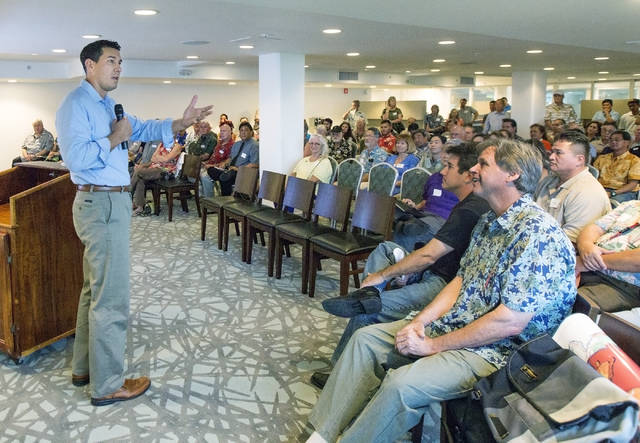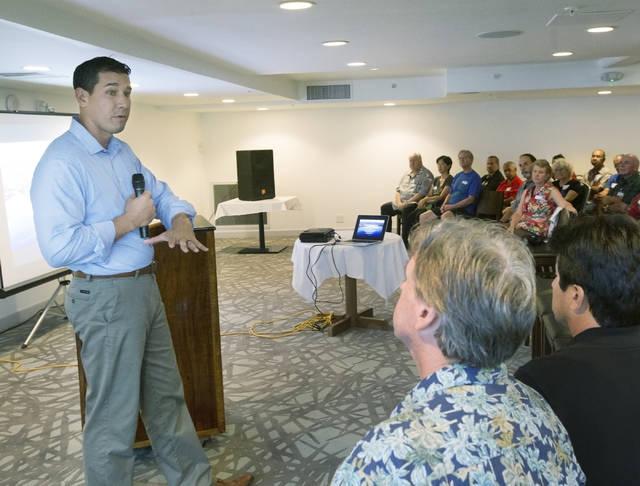HILO — East Hawaii legislators and business owners are urging the Hilo community to continue its support of a series of economic revitalization bills. ADVERTISING HILO — East Hawaii legislators and business owners are urging the Hilo community to continue
HILO — East Hawaii legislators and business owners are urging the Hilo community to continue its support of a series of economic revitalization bills.
A package of eight intertwined bills (four in each legislative chamber) was introduced this session to help address what many say are the most pressing barriers to economic development in town: the impending expiration of state leases on land in the Kanoelehua Industrial Area and the month-to-month lease status of properties in the Banyan Drive area.
The KIA leases, issued by the state Department of Land and Natural Resources after the 1960 tsunami destroyed that part of Hilo, had a 55-year term that recently was extended to 2025. Per Hawaii Revised Statues, the leases will be auctioned off at the end of the term.
“That’s what we’re trying to avoid,” said state Sen. Kai Kahele, D-Hilo, during a community meeting Wednesday at the Grand Naniloa Hotel that drew more than 80 people. “We think our community is better than that.”
The bills would create a special community economic district in that part of town under the Hawaii Community Development Authority, which is part of the state Department of Business, Economic Development and Tourism. There are three other community economic districts in the state, all on Oahu.
The measures also would amend Hawaii Revised Statutes to extend the leases themselves if lessees make substantial property improvements, and create a new redevelopment district on the Waiakea Peninsula.
Five of the eight bills crossed over last week and now await hearings.
“We just finished the second quarter,” Kahele said. “We’re in halftime right now.”
Mike Fujimoto, CEO of HPM Building Supply and a member of the Kanoelehua Industrial Area Association, thanked people for coming out to the meeting.
“This will give Hilo a real opportunity to rebuild itself, to really take full advantage of what our public really needs, what our public wants, and we have a lot of energy that’s involved right now,” he said.
That energy will be needed if East Hawaii is to convince an Oahu-centric Legislature that the Hilo measures should be passed, Kahele said.
“It’s very difficult (to object) when it’s the community’s voice,” he said. “Legislators know about these things we’re doing for Hilo and they’re excited about it and I think they’re willing to give it a chance.”
Several other factors appear to be tilting the scale in favor of passage.
Reps. Mark Nakashima, D-Hamakua, North Hilo, South Hilo, and Richard Onishi, D-Hilo, Keaau, Kurtistown, Volcano, both chair committees that are key in moving the bills through. Kahele said Oahu Sen. Glen Wakai, chairman of the Committee on Economic Development, Tourism and Technology, also was “very, very supportive.”
Additionally, the DLNR has remained neutral on the measures, offering comment but neither supporting nor opposing them.
“That’s very promising because if DLNR opposed it, then that would be it for some legislators,” Kahele said.
KIAA member Jim McCulley said supportive testimony was particularly important as one of the bills ran into an early snag because its original language was too broad. That caused it to be read by some as a “new PLDC” law.
The PLDC, or Public Lands Development Corporation, was a measure created in 2011 to develop public lands and create additional state revenue. It was so unpopular that it was repealed two years later.
The broad language in the bill was excised out, McCulley said before clarifying that the legislation was intended for “redevelopment of already urbanized property.”
“We’re not talking about extending (the district) beyond the existing confines,” he said. “We’re trying to make something better within the current bones of Banyan Drive and Kanoelehua. We don’t want the industrial area migrating over to house lots.”
Kahele said a resolution passed by the Hawaii County Council in support of the legislation also would help make a difference.
“Your testimony matters,” he said. “Every time more testimony comes in, more people get behind us. That’s how we’re all going to get this across the finish line.”




